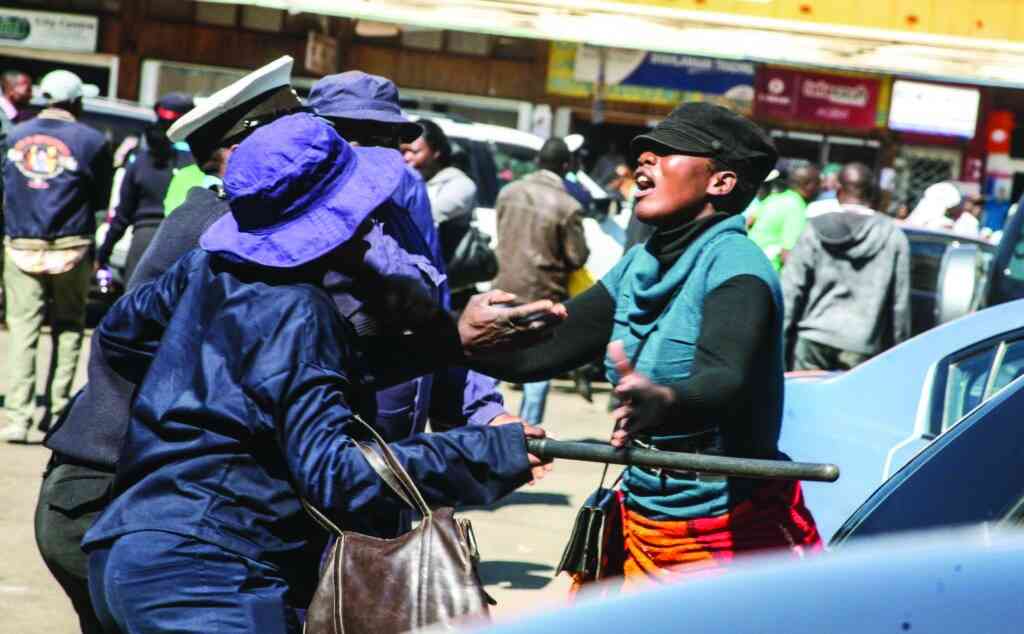
FOR Harare’s female vendors, the capital city’s streets are flashpoints for dangerous encounters with law enforcement officers.
But in a series of interviews conducted in partnership with the World Association of News Publishers, WAN-IFRA recently, the vendors said they had to perform an intricate balancing act — hiding their wares and children in cardboard boxes from municipal officers — and making sure at the end of each day, they earn enough to put food on the table.
The vendors are only a fraction of over five million Zimbabweans who have turned to street trade due to high unemployment and limited job opportunities.
But balancing between survival and fleeing is now a daily bread.
Yet, according to estimates from organisations like the International Monetary Fund, they are part of an informal economy that makes up 60% of the country’s gross domestic product.
The often-dangerous cat and mouse games demonstrate the cost of informalisation.
But even for those who have accepted formalisation, life has not been easy.
They complain of high taxes and fees – the driving forces behind high costs of doing business.
- Harare cancels Pomona waste deal
- Devolution gains remain a mirage
- Harare cancels Pomona waste deal
- Pomona saga: Harare handed shock US$750k ‘garbage’ bill
Keep Reading
Scores of these women navigate this harsh reality.
Their wares range from fresh vegetables to a vibrant second-hand clothing network.
They line the sidewalks through hot and cold weather — a testament to their entrepreneurial spirit.
In Harare, as in other cities, the majority of these vendors are women.
Harare’s officials acknowledge that street vending has become an important source of income.
But they say adhering to municipal by - laws is important to avoid disease outbreaks.
This means these traders must be licenced.
“We wouldn’t know the number of unlicensed vendors in Harare but they are certainly in their thousands as most people in the city have turned to vending to make ends meet,” said Stanley Gama, spokesperson for Harare City Council.
“Vendors need to go and operate at designated places and pay for an operating license fee, which ranges from US$35 to US$50,” Gama said.
In some cases, the vendors said they had been extorted by corrupt municipal officers.
Women have been among the biggest victims of corruption.
“We get complaints on a regular basis and so far we have suspended eight municipal officers on those charges and their matter is now on hearing stage,” Gama said.
“We always urge these vendors to report such cases but the challenge is, they just pay bribes and do not report. We only act on cases that are reported,” he added.
Many vendors are breadwinners in their households.
Claudine Saunyembe, a vendor, recounted the troubles she endures in Harare’s streets.
“They took my handbag, and all my stock of bags,” Saunyembe said.
“When I went to pay the fine, ten bags were missing," she added.
Reports suggest officers often share impounded goods.
Another female vendor who identified herself as Mbira, for fear of reprisals, said municipal officers took her vegetables once and she had no choice but pay a bribe.
“I still remember that day very well,” Mbira said.
“The municipal police came out of nowhere and I wasn’t prepared so I was too slow. They took my stock. I had to pull the officer a side and gave him something,” she added.
In Harare’s central business district (CBD), Copacabana is among vortexes of police raids.
Ashlyn, a single mother of two from Kambuzuma high density suburb, sells shoes at the place. She also explained her ordeal.
“My children are twins, and they are in Grade One,” she said.
“It is so stressful. I need to pay school fees and feed them. Selling goods here is helping me make ends meet.”
“However, with the raids, I have to run away. Sometimes the shoes that I sell fall away, and I make a loss. But that is how things are. It is a cat and mouse game. We are used to this, but it is draining,” Ashlyn said.
Farai, another vendor who operates from the Copacabana area, said: “This month alone (in May) the police have raided us twice. During the first raid I took my stock and hid it at a nearby shop. I left my baby sitting in a cardboard box. When I returned, I found her sitting and crying. It broke my heart.”
“I have to bring my daughter while I work. I make a profit to sustain us. But I do not make enough to pay for a license. It takes away my whole profit,” Farai said.
Samuel Wadzai from Vendors Initiative for Social and Economic Transformation said women constitute the majority of workers in the informal economy.
“Our estimations and that of the International Labour Organisation is that over 62% of workers in the informal economy are women and because of by-laws that are put in place by Harare City Council, we see a lot of violations happening to women. That hinders their ability to grow and contribute to the development of the economy,” Wadza said.






